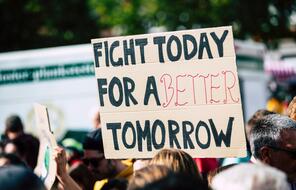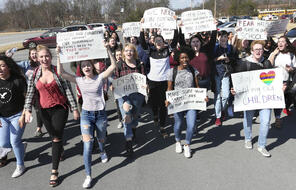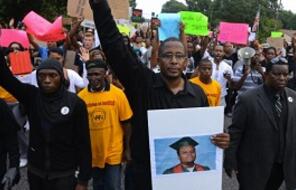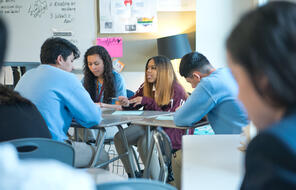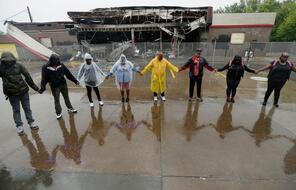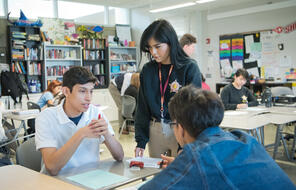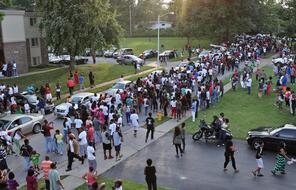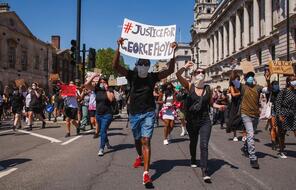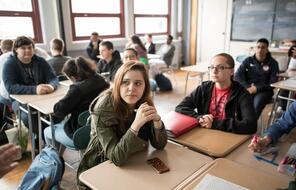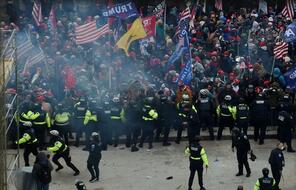Free and Fair Elections
At a Glance
Language
English — USSubject
- Civics & Citizenship
- History
- Social Studies
- Democracy & Civic Engagement
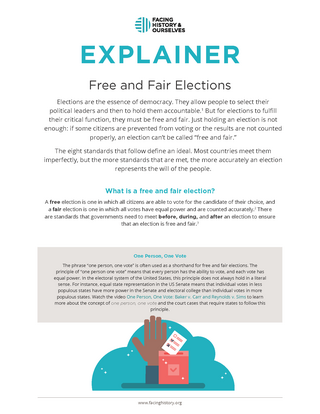
Explainer: Free and Fair Elections
Download a PDF of this resource for free
Elections are the essence of democracy. They allow people to select their political leaders and then to hold them accountable. 1 But for elections to fulfill their critical function, they must be free and fair. Just holding an election is not enough: if some citizens are prevented from voting or the results are not counted properly, an election can’t be called “free and fair.”
What is a free and fair election?
A free election is one in which all citizens are able to vote for the candidate of their choice, and a fair election is one in which all votes have equal power and are counted accurately. 2 There are standards that governments need to meet before, during, and after an election to ensure that an election is free and fair. 3
The eight standards that follow define an ideal. Most countries meet them imperfectly, but the more standards that are met, the more accurately an election represents the will of the people.
- 1Steven L. Taylor, Matthew S. Shugart, Arend Lijphart, and Bernard Grofman, A Different Democracy (Yale University Press, 2014).
- 2Kara E. Stooksbury, John M. Scheb II, Otis H. Stephens Jr. (editors), Encyclopedia of American Civil Rights and Liberties: Revised and Expanded Edition, 2nd Edition, Volume 2 (ABC-CLIO, 2017), 386.
- 3The standards included in this explainer are adapted from Declaration on Criteria for Free and Fair Elections, Encyclopedia of American Civil Rights and Liberties, Losers' Consent: Elections and Democratic Legitimacy, and OSCE US Mission Free and Fair Elections.

One Person, One Vote
The phrase “one person, one vote” is often used as a shorthand for free and fair elections. The principle of “one person, one vote” means that every person has the ability to vote, and each vote has equal power. In the electoral system of the United States, this principle does not always hold in a literal sense. For instance, equal state representation in the US Senate means that individual votes in less populous states have more power in the Senate and electoral college than individual votes in more populous states. Watch the video One Person, One Vote: Baker v. Carr and Reynolds v. Sims to learn more about the concept of “one person, one vote” and the court cases that require states to follow this principle.
Before Voting

-
Citizens are able to register to vote
Governments can place some restrictions on who can register to vote based on age, residency, or citizenship status. However, for an election to be free and fair, governments cannot prevent eligible voters from registering or make it more difficult for some groups of people to register than others. For example, until the Voting Rights Act was passed in the United States in 1965, many Southern states required Black voters to take literacy tests in order to register to vote. [These tests were designed to be impossible to pass and to prevent Black people from voting, which means that the elections held in these states during this time period were not free and fair. 1
ASK YOURSELF:
Note: If you live in the United States, you can use the resource vote.gov to look up voter registration in your state.
- What is the process to register to vote in my country, state, or region?
- Are there restrictions on who can register to vote where I live?
- Are these restrictions necessary and fair? Why or why not?
-
Voters have access to reliable information
Governments cannot prevent the media from covering certain candidates or political parties, and they also cannot intentionally spread misinformation. For example, in the 2020 presidential election in Burundi, President Nkurunziza ran for a third term. His government threatened or imprisoned journalists to prevent them from reporting on the candidates who ran against him. 2 Even when governments do not intentionally share misinformation, it can spread online and through social media. Voters need access to reliable and unbiased information to freely make decisions about which candidate to support.
ASK YOURSELF:
- What, if any, challenges do I face in finding reliable and unbiased information about candidates and elections?
- Do the internet and social media make it easier or more difficult to find quality information?
-
Citizens can run for office
Governments cannot attack or intimidate people who decide to run for office or create discriminatory rules about who is allowed to run. For example, in a 2019 city election in Moscow, Russia, opposition candidates—people who were running against the ruling party—were not allowed to place their names on the ballot. 3 Voters cannot freely exercise their right to select their leaders if certain political parties or candidates are unfairly blocked from running for office.
ASK YOURSELF:
- What restrictions are there in my country, state, or region on who can run for office?
- Why do I think these restrictions are in place?
- Are these restrictions necessary and fair? Why or why not?
During Voting
- 1Vanessa Holloway, In Search of Federal Enforcement : The Moral Authority of the Fifteenth Amendment and the Integrity of the Black Ballot, 1870–1965 (University Press of America, 2015).
- 2“Independent press locked out of Burundi’s presidential election,” Reporters Without Borders, May 20, 2020.
- 3Tanya Lakshina, “Opposition Candidates Squeezed Out of Upcoming Moscow Election,” Human Rights Watch, July 19 ,2019.

-
All voters have access to a polling place or another method of voting
People need to be able to freely cast their ballots. Voters should be able to reach polling stations, enter them, and cast their votes regardless of who they are or where they live. If voters are unable to vote in person—for example because of a disability, health condition, or a lack of transportation—they should have access to an alternative method of voting, such as voting by mail. For example, during the 2019 elections in India, voting machines were brought to remote communities by a variety of means—including by helicopter, boat, and elephant—to ensure that all eligible voters had access to polling places. 1
ASK YOURSELF:
Note: If you live in the United States, you can use CNN’s resource Understanding Mail-In Voting to look up information about your state.
- Where is the closest polling place to my home?
- How easy is it to vote by mail in my country, state, or region?
- How fair is the access to voting in my state?
-
People can vote free from intimidation
Polling places should be safe. Violence, or the threat of violence, can make people feel afraid to vote for their candidate of choice or even prevent people from voting at all. Secret ballots can also help prevent coercion or intimidation since they help prevent people from targeting voters based on whom they voted for. In US elections in 1875 and 1876, paramilitary groups associated with the Democratic Party violently attacked Black voters in Mississippi and South Carolina, preventing scores of Black southerners from voting and causing the interracial Republican Party to lose control of the state governments established after the Civil War. 2 As recently as the 1981 gubernatorial election in New Jersey, the Republican party organized armed poll watchers to patrol polling places in predominantly Black and brown neighborhoods. The courts found that these poll watchers intimidated many potential voters, preventing them from voting. 3
-
Voting is free from fraud
Every eligible voter should be able to vote only one time, and ineligible voters should be prevented from voting. For example, opposition leaders in Cameroon accused the ruling party of filling out hundreds of ballots in their favor to stuff into ballot boxes during local and parliamentary elections held in 2020. 4 When illegal ballots are included, the election does not reflect the will of voters. Most countries have poll watchers who observe voting at polling places to ensure that the election is run properly and no fraud is committed.
In the United States, voter fraud is extremely rare. For example, a 2007 Brennan Center report found that incidents of voter impersonation in the United States were between 0.0003% and 0.0025%. 5 More recent research has continued to confirm that all types of voter fraud in the United States, including double voting—voter impersonation and ballot forging—are either non-existent or almost non-existent. 6
ASK YOURSELF:
Note: If you live in the United States, you can find information about poll watchers here.
- What measures does my country, state, or region take to ensure that elections are protected from fraud?
- What role can individuals play in ensuring an election is free and fair?
After Voting
- 1Russell Goldman, “What It Takes to Pull Off India’s Gargantuan Election,” New York Times, April 13, 2019.
- 2The Reconstruction Era and the Fragility of Democracy, Facing History and Ourselves. 208-212.
- 3Robert Joffee, “Democrats Accuse GOP of Intimidating Minorities in N.J. Voting,” New York Times, November 8, 1981; “DNC v. RNC Consent Decree,” Brennan Center for Justice, November 5, 2016.
- 4Moki Edwin Kindzeka “Cameroon Opposition Alleges Ballot-Stuffing as Elections Marred by Violence,” VOA, February 11, 2020.
- 5Justin Levitt, “The Truth About Voter Fraud,” Brennan Center for Justice, November 9, 2007.
- 6"Debunking the Voter Fraud Myth,” Brennan Center for Justice, January 31, 2017; Moki Edwin Kindzeka, “Explainer: Despite Trump claims, voter fraud is extremely rare. Here is how U.S. states keep it that way,” Reuters, September 9, 2020.

-
Ballots are counted accurately and the correct results are announced
Ballots cannot be altered or discarded after they are cast, and all ballots cast by voters must be counted. Most countries have independent electoral commissions or agencies that oversee elections to prevent individuals or the government from interfering in the results. In the 2020 presidential election in Belarus, some poll workers claimed that they were forced to falsify vote counts to allow current president Alexander Lukashenko to remain in power. 1 Ballots must be counted correctly in order for an election to reflect the will of voters.
ASK YOURSELF:
Note: If you live in the United States, you can use this resource to find your state election office website or read the article How the Votes Are Counted on Election Day.
- Who counts ballots in my country, state, or region? How do they count the ballots?
- When does the media report the results of an election? Why does this matter?
-
The results of the election are respected
Once the outcome of the election is decided, the candidates must respect the results of the vote. Peaceful transitions of power are vital to democracy, and candidates who are defeated in the polls should not use violence or intimidation in order to seize power.
- 1Kostya Manenkov and Daria Litvanova, “Belarus poll workers describe fraud in Aug. 9 election,” Associated Press, September 1, 2020.

